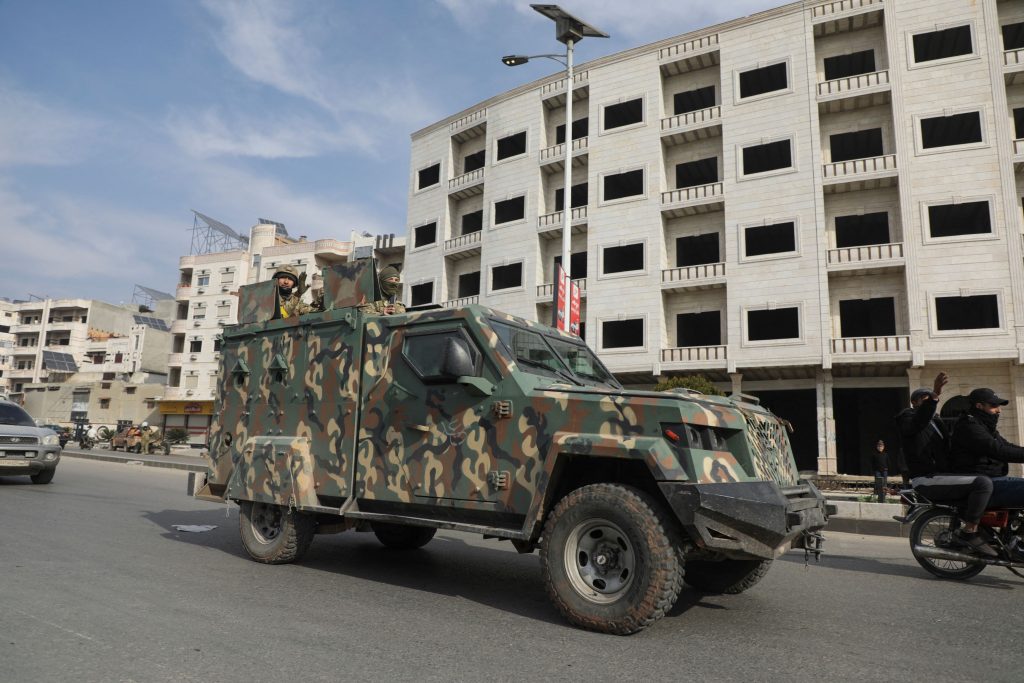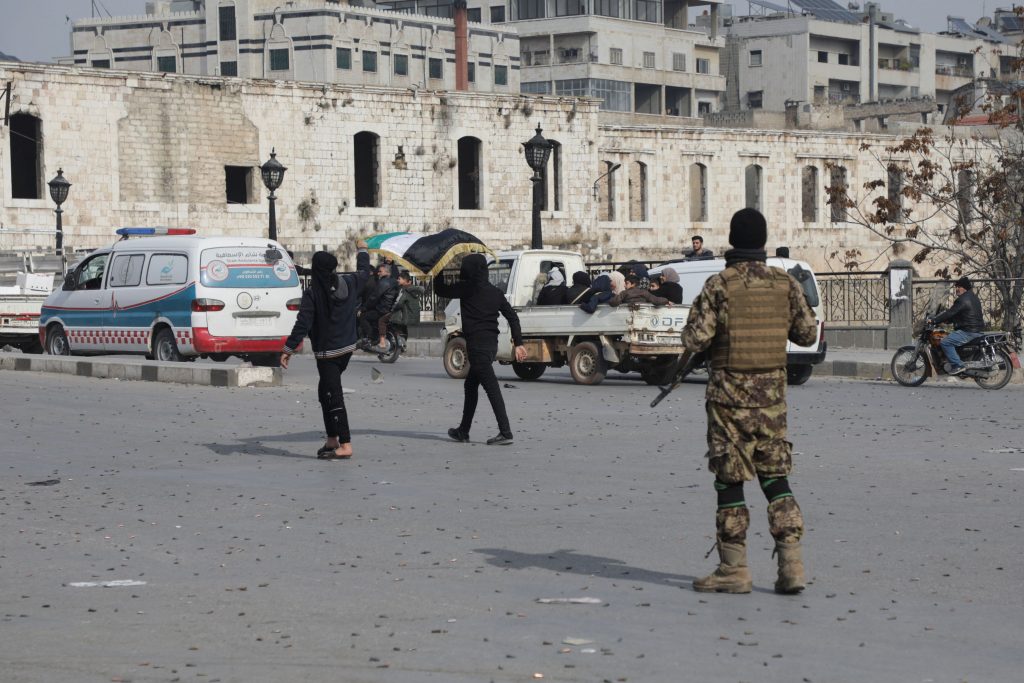A rapid advance by Syrian rebels in recent days is giving the NATO member Turkey more power to limit Russian and Iranian influence in the region, but also risks triggering new instability on Ankara’s doorstep.
Turkey has longstanding relations with rebels who captured the city of Hama on Thursday and seized Syria’s second-largest city, Aleppo, days earlier. The offensive marks the stiffest challenge in years for the regime of Syrian President Bashar al-Assad , which is backed by Moscow and Tehran.

A rebel fighter gestures, after rebels led by HTS have sought to capitalize on their swift takeover of Aleppo in the north and Hama in west-central Syria by pressing onwards to Homs, in Hama, Syria December 6, 2024. REUTERS/Mahmoud Hasano
The advance stands to bolster Turkey’s sway over Syria’s future, especially with Russia occupied by war in Ukraine and Iran locked in confrontation with Israel. The government of Turkish President Recep Tayyip Erdogan is now in a stronger position to put pressure on Kurdish militias it opposes in Syria, some of which have ties to the U.S.
Turkey’s new position of strength could help it take a harder line in negotiations with Russia and Iran over Syria’s future. Ankara has sought to freeze the conflict through a settlement with Assad and this week urged his regime to pursue a political solution to the conflict.
“Our wish is that this march in Syria continues without any accidents,” Erdogan said on Friday as rebels continued to advance. At the same time he called the opposition offensive “troublesome.”
The rebel offensive also gives Turkey an opening to try to ease the pressure on its southern border. The rebels and more than a million Syrians, mostly refugees, have been largely hemmed in by previous fighting at an enclave in northern Syria. In addition, more than three million Syrians have fled into Turkey during the civil war, which began more than a decade ago. Now, as the rebels capture more territory, some in the Turkish government hope that some of those refugees might see a chance to return home.
“Erdogan definitely wants to turn this into an opportunity,” said Gonul Tol, director of the Turkey program at the Middle East Institute in Washington and author of a book on Erdogan’s handling of the Syrian war. “Assad is weakened. The size of the territory that the rebels are holding is just so dramatic, and that gives Turkey more leverage.”
At the same time, the rebel advance poses new risks for Turkey, after several years in which fighting in Syria largely abated. Russia and the Syrian regime intensified airstrikes on Aleppo and other rebel-held territories in recent days, and a return to intense combat could send waves of refugees into Turkey, rather than easing pressure on its border.
In addition, other countries, including the U.S. and Russia, might look to Ankara for help in trying to rein in the rebel leader Abu Mohammed al-Jawlani, a longtime jihadist who has said he has given up extremism.
Jawlani heads the largest rebel group, Hayat Tahrir al-Sham, a U.S.-designated terrorist organization. Turkey has a longstanding relationship with HTS through its intelligence services, though Ankara doesn’t directly control the group.
The U.S., an ally of Turkey in the North Atlantic Treaty Organization, has said that its aim in the current crisis in Syria is to de-escalate the fighting and protect civilians and minority groups.
“Everybody should be working to get a cease-fire as quickly as possible. That means getting the Turks on board. It also means getting the Russians and Iranians and the Syrian government on board,” said Robert Ford, a former U.S. ambassador to Syria. “If there’s going to be a cease-fire, HTS, absolutely positively, has to be part of it.”
After initially holding back, other Turkish-backed rebel factions have joined the HTS-led offensive against Assad. That effort has also captured territory from Kurdish-led factions near Aleppo, in another sign of how Turkey intends to use the situation to its advantage.

A rebel fighter holds a weapon, after rebels led by HTS have sought to capitalize on their swift takeover of Aleppo in the north and Hama in west-central Syria by pressing onwards to Homs, in Hama, Syria December 6, 2024. REUTERS/Mahmoud Hasano
Erdogan was once the most important foreign backer of the armed rebellion against Assad following the 2011 uprising against his rule. The Turkish president allowed fighters and weapons to flow across Turkey’s border into Syria.
But the war soon became a burden for Erdogan. Assad remained in power with military support from Russia and Iran, and extremist groups such as Islamic State seized parts of Syria and launched attacks in Turkey. An influx of refugees stirred nationalist criticism of the Turkish government.
In recent years, Erdogan has shifted his approach, sealing the border to refugees and launching negotiations with the Syrian government in hopes of settling the conflict. As part of a 2020 cease-fire agreement, Turkey stationed military forces in the rebel enclave, in Syria’s northern Idlib province.
Turkish officials said the government had no role in supporting or granting permission for the recent rebel attack. “Turkey is not involved in the clashes in Aleppo,” Turkish Foreign Minister Hakan Fidan said late last month.
At the same time, people familiar with how Turkey manages its relationship with HTS said the government would have likely learned of plans for the attack ahead of time. Turkey has contact with the group through its intelligence services and manages a shared border, while Turkish personnel operate on the ground in the rebel-held northwest.
“These people are camped out literally within sight of Turkey. So they would have known in advance that HTS was going to launch this offensive,” said James Jeffrey , a former U.S. ambassador to Turkey and onetime U.S. envoy for the global campaign against Islamic State.
The rebel military offensive has been well-organized, military analysts said, an indication of planning that would likely have given Turkish officials time to find out about the attack.
“The connections that Turkey has established over the years and its presence on the ground would lead me to assume that Turkey had some knowledge of an incremental development that was brewing there,” said Alper Coşkun, a former director of international security at the Turkish Foreign Ministry. “Whether Ankara would have been able to foresee the quick collapse of the Syrian forces, that’s another question.”
The Turkish Foreign Ministry didn’t respond to a request for comment on whether Turkey was warned of the offensive.
Erdogan spoke Tuesday to Russian President Vladimir Putin , telling him, according to the Turkish presidency, “Syria should not become a source of greater instability,” and that Turkey was doing its utmost to restore calm.
Aaron Stein, president of the Foreign Policy Research Institute in Philadelphia, said Turkey would prefer to stabilize the situation through a broader agreement with Russia, in part to avoid a repeat of an earlier phase of the war in which Russian airstrikes helped roll back the rebels and contributed to the flow of refugees.
“The Russian aviation unit there is about ready to glide-bomb the hell out of the front lines,” he said. “The Turks would like to stop that.”
Write to Jared Malsin at jared.malsin@wsj.com


